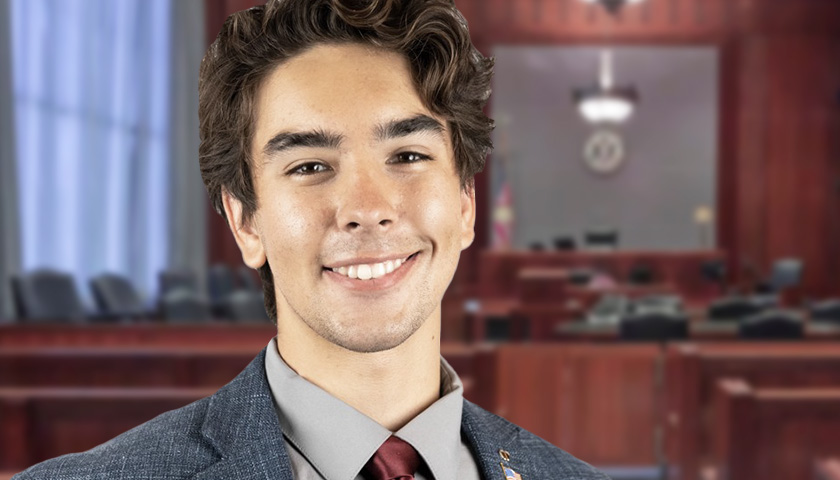Maricopa County agreed last week to pay The Gateway Pundit (TGP) and its reporter Jordan Conradson $175,000 to settle their lawsuit over refusing to provide Conradson with a press pass to cover elections. An Obama-appointed trial court judge sided with the county in November, but after an injunction from the Ninth Circuit Court of Appeals followed by oral arguments that revealed the three-judge panel was likely to reverse the lower court fully, the Maricopa County Supervisors voted to settle.
The controversy began in September 2022 when the county implemented a press pass regulation blocking journalists from election press conferences if they showed “conflicts of interest” and were not “free of associations that would compromise journalistic integrity or damage credibility.” The county cited Conradson’s attendance at Republican events as a conflict of interest and told him, “[Y]ou are not a bona fide correspondent of repute in your profession.”
Conradson has written numerous articles critical of Maricopa County’s handling of elections. TGP filed the lawsuit alleging violations of the First Amendment in November, TGP Communications, LLC v. Jack Sellers.
After U.S. District Judge John Tuchi denied relief in November, the Ninth Circuit temporarily reversed him. It granted an injunction, allowing Conradson a press pass pending appeal, since “At least at this preliminary stage, Appellants have shown a likelihood of success on the merits.” The court warned in its order, “A restriction on speech is unconstitutional if it is ‘an effort to suppress expression merely because public officials oppose the speaker’s view.’ In evaluating claims of viewpoint discrimination, ‘[w]e thus look to the government’s purpose as the threshold consideration.’”
“It is the county’s politically-tinged assessment of Conradson’s prior reporting that appears to have led it to deny him a press pass,” the order read. “That type of viewpoint-based discrimination is exactly what the First Amendment protects against.”
The court had some scathing words for the county. “Permitting ‘truth’ to be determined by the County violates our foundational notions of a free press,” it stated. The court also criticized the county’s reasoning, “Relying on a reporter’s attendance at political party events is weak grounds — and a poor measuring stick — for determining a journalistic conflict of interest.”
The court said, “[T]he evidence put before the district court — including that presented by the County itself — strongly suggests that a predominant reason for the County denying Plaintiffs a press pass was Conradson’s political views.”
HUGE WIN! The 9th circuit court of appeals has ruled on the side of our First Amendment in @gatewaypundit’s lawsuit against @MaricopaCounty’s totalitarian attempts to control the narrative pic.twitter.com/xFcb8RUUJW
— Jordan Conradson🇺🇸 (@ConradsonJordan) December 5, 2022
This overturning of the lower court’s refusal to grant an injunction put the county on notice the court was likely to reverse the lower court fully.
“[A] reporter should be able to associate with credible and non credible people and I mean, that’s how they kind of do their business,” Judge Ryan D. Nelson stated. “But, but I guess back to my question, is the conflicts of interest, is it appropriate subject matter? It’s just got to be more narrowly defined here. It can’t give such broad discretion to the county.”
While Maricopa County Deputy County Attorney Charles Trullinger was speaking, stating that the county made the decision based on focusing on the “process of the newsmaking” by Conradson, Nelson interrupted him. “I gotta be honest, what you just said seems like a blatant violation of the First Amendment,” he said. “I mean, to discuss how they’re doing their news gathering. I don’t even understand that. First of all, I don’t even see that the standards, the standards, don’t talk about that; the standards talk about conflicts of interest, have nothing to do with what you just said.”
Nelson responded to Trullinger again after he resumed his argument, “I’m trying to give you the benefit of the doubt, but this argument is raising more red flags. … Everything you just said has nothing to do with conflict of interest. And if it does, it’s a very contorted view of conflict of interest.”
Nelson continued, “You seem to be on very thin ice on the argument you’re making. You seem to be trained to defend a position that, in my opinion, is just constitutionally indefensible under the First Amendment.”
After listening to Trullinger’s argument, Judge Consuelo Callahan also had harsh words for the county. “It seems to me that the county still thinks it’s right,” she said. “And if you’re advising them that they’re still right, and it’s just three crazy Ninth Circuit judges that are telling them that they don’t understand the First Amendment. There is some concern in your legal advice going to them and then being the arbiter of people that are coming through if they don’t accept what goes into content actually means or what the First Amendment means, because I think, much like what Judge Nelson said, the concern level escalated as you listed what they think is okay, and that what you’re telling them is okay.”
TGP and other legal experts argued that Conradson’s exclusion was “impermissibly content- and viewpoint-based.”Legal scholar Eugene Volokh said, “The evidence supports, at least at this preliminary stage of the review, the conclusion that a predominant reason for the County denying Conradson a press pass was the viewpoint expressed in his writings.”
The Foundation for Individual Rights in Education (FIRE) filed an amicus curiae brief in the appeal. FIRE accused the county, “Maricopa County elections officials wanted to tamp down negative coverage of their election oversight.”
The county blamed Conradson for death threats that county officials have received as part of its justification. However, officials on both sides of the election integrity issue regularly receive threats; they don’t go public about them as Maricopa County leadership does. Many have told The Arizona Sun Times about the threats but prefer to remain anonymous.
When the press pass policy was implemented, Maricopa County Recorder Stephen Richer retweeted Jen Fifield, a reporter for the far-left Votebeat, who said, “County elections getting all fancy. Really gonna miss the Gateway Pundit rolling in and trying to listen in on legitimate reporter conversations/intimidate public officials.” Richer later deleted the retweet.
Votebeat is part of the George Soros/Rockefeller-funded Institute for Nonprofit News. Votebeat’s parent company Chalkbeat received $2,672,491. When reporters applied for press passes, the county required them to affirm, “I do not receive compensation or special treatment from advertisers or political organizations that would influence my coverage related to Maricopa County or its elections. I am not a lobbyist, advertiser, paid advocate or influencer for any individual, political party, corporation, or organization.”
Tuchi has made other rulings against election integrity. Tuchi sanctioned the attorneys of Kari Lake and Mark Finchem last year for filing a lawsuit challenging the use of electronic voting machine readers in elections.
– – –
Rachel Alexander is a reporter at The Arizona Sun Times and The Star News Network. Follow Rachel on Twitter. Email tips to [email protected].
Photo “Jordan Conradson” by Jordan Conradson. Background Photo “Courtroom” by 12019.





